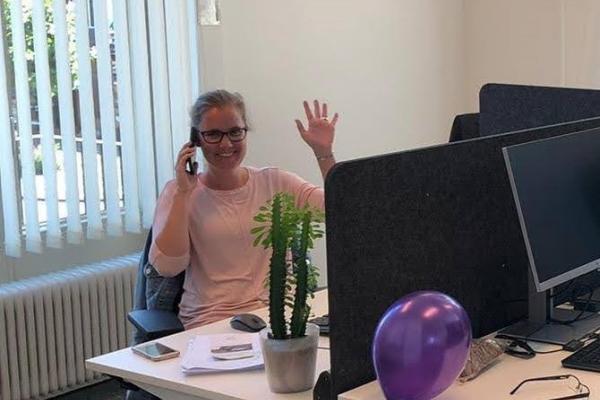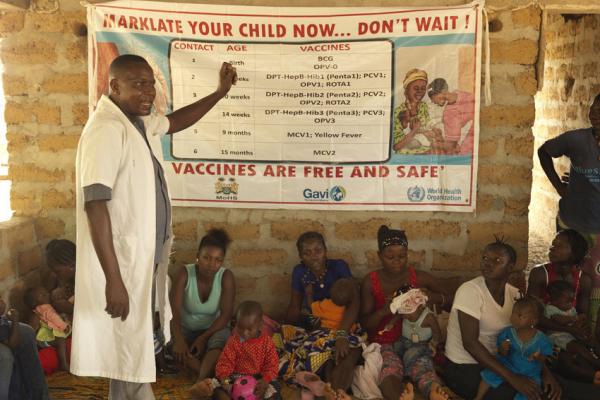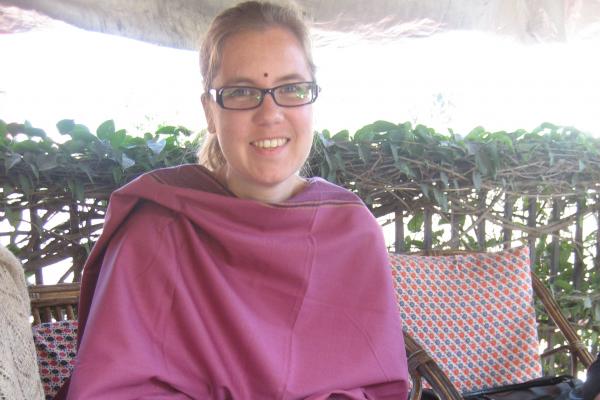Nurse Willeke Gerritsen shares how volunteering during the Ebola outbreak in 2014 prepared her to take on COVID-19 in the Netherlands.
Over the course of five years, Willeke Gerritsen volunteered with VSO in Nepal, Papua New Guinea and Sierra Leone, sharing her nursing expertise with local nursing staff.
Now, working in public health in the Netherlands on the COVID-19 crisis, she poses her biggest challenge yet – and the lessons she learned as a volunteer are more relevant today than ever before. Here, Willeke shares how her experience as a volunteer equipped her to take on COVID-19.
On the eve of the Ebola outbreak

In April 2014, Willeke Gerritsen, 37, flew out to Sierra Leone to share her skills and expertise from over 15 years as a nurse with local nursing staff stationed at community outreach posts.
Originally from the Netherlands, Willeke was based in Kambia, Sierra Leone, where she began training health professionals in the vital skills they needed to save the lives of mothers and babies, as well as embarking on the difficult task of improving the management of these clinics. Often, the rural clinics would be without basic medicine, like antibiotics or paracetamol.
By now, Ebola was tearing through neighbouring Guinea and Liberia, but had yet to reach Sierra Leone.
“At some point it became uncomfortable because I knew Ebola was coming closer. However, VSO had good guidelines on how to deal with it and were monitoring the situation.”
Just two weeks later, Sierra Leone announced a national emergency, and Willeke sadly had to fly home as VSO took the difficult decision to evacuate volunteers to ensure the safety of those volunteering in Sierra Leone.
Supporting the fight against Ebola
Keen to support efforts to tackle Ebola, Willeke returned to Sierra Leone to work with the Red Cross.
“I was in an Ebola treatment centre. We were responsible for collecting data to do contact tracing, and letting people know they needed to quarantine for 21 days.”
“My family was very supportive, but of course they were worried,” says Willeke, who also provided psychological support and arranged safe funerals for Ebola patients.
“People had to be buried quickly, so families weren’t always able to be there. We made sure that not only were there infection prevention measures, but also that the funeral was done with dignity.”
“In Sierra Leone, traditionally lots of family members would attend funerals and people would touch and wash the body before burial. We had to strongly advise against it.”
Willeke says similar cultural upheaval has happened in the Netherlands, since the start of the coronavirus pandemic:
“Now, in the Netherlands, you’re not allowed to shake hands. We’re very used to shaking hands when you meet a new person. So how we approach a virus can depend and impact on day-to-day behaviours.”
After a month of intense work on Ebola, Willeke returned to the Netherlands before volunteering with VSO in Papua New Guinea from 2015 to 2017 on a project improving the delivery of nursing education at nursing schools.
From Ebola to COVID-19
Since returning home in 2017, Willeke began a career in Public Health, working to prevent the spread of diseases through society. When coronavirus hit, Willeke found herself once again on the front lines of a health crisis – this time on a global scale.

Willeke and her team advise companies, organisations and the wider public on how to prevent the spread of coronavirus – for example, by working with testing centres to make sure staff know how to protect themselves from the virus.
Willeke has noticed some parallels between Ebola and COVID-19.
“In a way, what was happening there is happening now. Ebola spread in a different way, but now, in the COVID-19 pandemic, there are still people who don’t trust the government here in the Netherlands and think it spread because of Bill Gates.
“There were rumours in Sierra Leone with Ebola, too. There was a radio broadcast which told people to not send children to school because the children will be vaccinated today, and they put Ebola in the vaccine.
“These are really remote villages, where the radio is their only communication source.
"People hear those messages and don’t get the other side of the story.”

A once-in-a-lifetime experience
Now a year into the pandemic, Willeke reflects on how her time volunteering helped her develop the skills she needs for a life’s work preventing the spread of diseases.
“I developed training, coaching and facilitation skills during my time as a volunteer,” says Willeke.
“From volunteering with VSO and during Ebola, I learned to be flexible and adaptable to new and fast-changing circumstances. I learned how to cope with stressful situations.”
“As a VSO volunteer, you work together with local colleagues and share your skills.”
“Volunteering is incredibly rewarding and a once-in-a-lifetime experience.”
Since the start of the pandemic, we’ve been adapting our work to make sure communities stay healthy, and people understand how to keep their families safe.
You can help protect more families against coronavirus by donating here:
Donate to VSO’s COVID-19 response >
Read more

Transforming lives through education: Geoffrey’s VSO legacy
With a deep belief in the transformative power of education, Geoffrey from Norfolk, UK, has devoted his life both in the UK and abroad to making education more accessible for all.

The two volunteers empowering girls and young women in Mozambique
Nelma and Carmirene and are two volunteers working on VSO's EAGLE project in Mozambique. For Nelma and Carmirene, education is not just about school, it is about meeting people where they are and using the right tools to challenging harmful norms. Here are their stories.

A ripple of change: how VSO volunteers are transforming communities
Every act of volunteering begins with a choice — a decision to act out of a desire to make a difference. Across the world, VSO volunteers are proving that one spark of action can ignite something much bigger.
